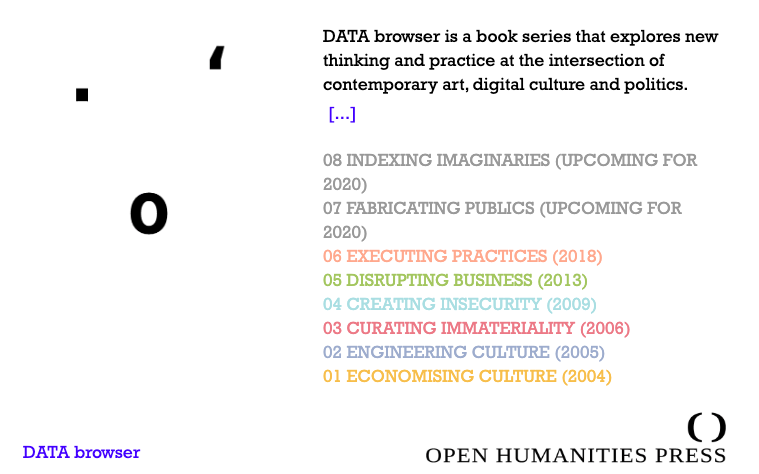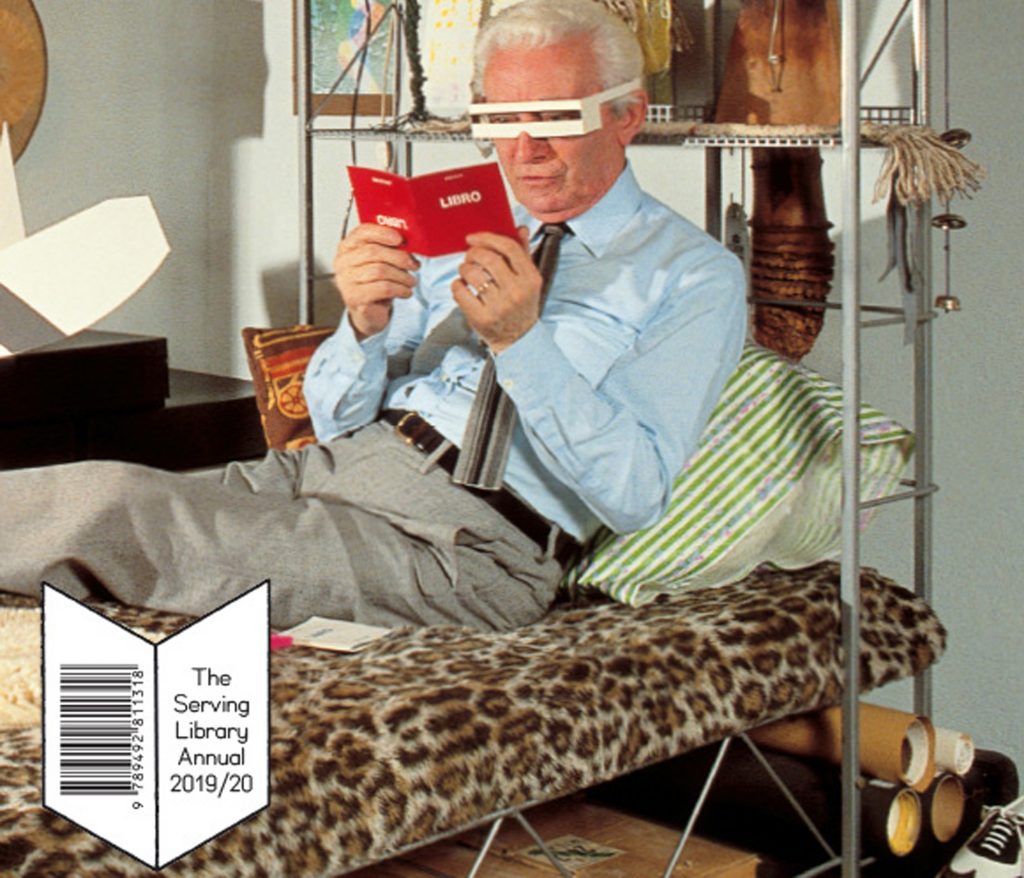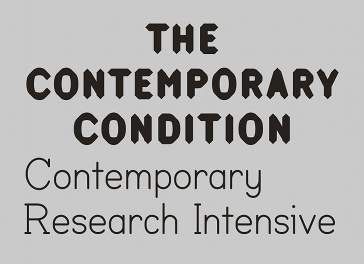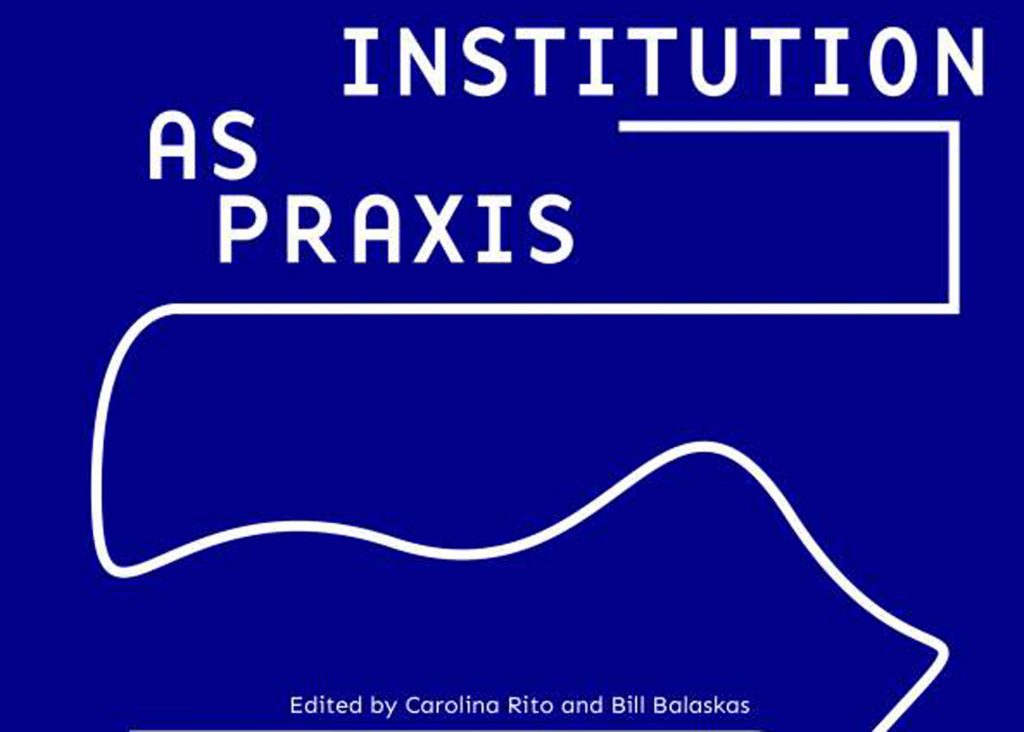DATA Browser

The DATA Browser book series explores new thinking and practice at the intersection of contemporary art, digital culture and politics. The series takes theory or criticism not as a fixed set of tools or practices, but rather as an evolving chain of ideas that recognise the conditions of their own making. The term “browser” is useful in pointing to the framing device through which data is delivered over information networks and processed by algorithms. Whereas a conventional understanding of browsing suggests surface readings and cursory engagement with the material, the series celebrates the potential of browsing for dynamic rearrangement and interpretation of existing material into new configurations that are open to reinvention. Combining an active verb and noun in the title as a stylistic device, each book includes contributions from established and emerging academics in conventional written forms as well as visual and/or experimental modes.
DATA Browser was established in 2004 and until 2017 published by Autonomedia (New York), and has been supported by Arts Council England, Aarhus University and University of Plymouth.
It is supported by Exhibition Research Lab, Liverpool John Moores University, and The Centre for the Study of the Networked Image, London South Bank University, and is published by Open Humanities Press.
Stages

Stages is an open access contemporary art journal published by Liverpool Biennial in partnership with Exhibition Research Lab. It is dedicated to staging research generated in the context of Liverpool Biennial’s artistic programme. Commissioning Editors are Joasia Krysa and Fatoş Üstek.
It is freely available both online and in PDF format at:
https://www.biennial.com/journal
The Serving Library Annual 2019/2020

The 2019/20 issue of The Serving Library Annual is entirely devoted to the late Italian designer, artist, inventor and polymath Bruno Munari. The core of the annual is the first English translation of Obvious Code, the 1971 collection of Munari‘s own writings, sketches and poems about his own work, published by arrangement with Corraini, who issued the book’s anastatic edition in 2017. It includes iconic design objects such as the Abitacolo, ground-breaking artworks such as his 1952 series of hand-made projection slides, and little known rhymes about the art market, as well as an original piece from his “unreadable books” series. In the margins, dozens of artists, designers, writers and curators have been invited to annotate Munari‘s texts — with a sketch or a quotation, an in-depth analysis, a fragment of conversation, a free association — as a testament to the depth of the influence exerted on international art by an often under acknowledged pioneer, whose visual experiments were so iconic as to become a self-evident part of visual culture, an anonymous invention: an obvious code.
Edited by Francesca Bertolotti-Bailey, Stuart Bertolotti-Bailey, Vincenzo Latronico, and David Reinfurt.
The translation was produced with the cooperation of Corraini Edizioni and is published with Roma Publications. The publication was produced whilst in residence at Exhibition Research Lab.
Contemporary Research Intensive

Contemporary Research Intensive is a publication acting as the outcome of an event of the same name, organised as part of the 57th Venice Art Biennale to investigate the concept of “contemporaneity.”
Gathering together artists/curators/researchers through an open call, we asked how the temporal complexity that follows from the coming together of different temporalities in the same present could be made known in the context of contemporary art research, and particularly through practices that involve exhibitionary forms. The book—the tenth volume of The Contemporary Condition—is both part and result of the intensive sharing of ideas to produce something that captures the spirit of both discussions at that time and the publication process as a temporal form.
Organised by The Contemporary Condition research project & Contemporary Aesthetics and Technology research program, Aarhus University & Exhibition Research Lab, Liverpool John Moores University, in partnership with Venice Faculty for Arts and Design, University of Architecture IUAV, Uniarts Helsinki and the Research Pavilion in the context of the 57th Venice Art Biennale. It is published by Sternberg Press.
Institution as Praxis—New Curatorial Directions for Collaborative Research

Institution as Praxis—New Curatorial Directions for Collaborative Research explores new curatorial and artistic practices that contribute to the expansion of institutional, practice-based, and collaborative research methods. This publication offers an overview of how creative practices are modifying the ways we think about both knowledge production and research in the cultural sector and in academia. Institution as Praxis aims to identify and advocate for a multiplicity of practices taking place across the cultural sector that do not only engage with the quest to deliver cultural activities (e.g. exhibitions, events), but generate new modes of knowledge production and research in the field of visual culture, art, and the curatorial.
Institution as Praxis is published by Sternberg Press, and is part of a broader research strand initiated by Carolina Rito at Nottingham Contemporary. The publication includes contributions from Exhibition Research Lab staff Prof. Joasia Krysa and Dr Michael Birchall. A copy of Prof. Krysa’s contribution can be downloaded below:
